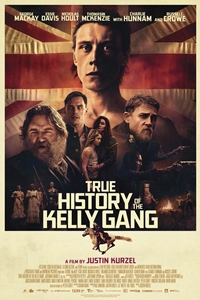True History of the Kelly Gang (R) ★★★
 Justin Kurzel's True History of the Kelly Gang opens with a warning that nothing in the film is true. Although that might be stretching things a bit, it puts viewers on notice that the events depicted herein adopt as gospel the Robin Hood-like Aussie folklore that has developed around bushranger Ned Kelly (George MacKay) and his gang of outlaws. As with Peter Carey's source material, factual history is not a particular concern. (Or, as it's said, never let facts get in the way of a good story.)
Justin Kurzel's True History of the Kelly Gang opens with a warning that nothing in the film is true. Although that might be stretching things a bit, it puts viewers on notice that the events depicted herein adopt as gospel the Robin Hood-like Aussie folklore that has developed around bushranger Ned Kelly (George MacKay) and his gang of outlaws. As with Peter Carey's source material, factual history is not a particular concern. (Or, as it's said, never let facts get in the way of a good story.)
True to its opening caption, everything about True History of the Kelly Gang emphasizes its Tall Tale aspects, from the electric, trippy cinematography to the larger-than-life performances of the lead actors. The movie is dark and brutal, illustrating the tensions between the British overlords and those who have been exiled to the Land Down Under. Class and sexuality play important roles in the movie's panorama, with Ned's personality shaped by both. Born into poverty, his youth is an unending litany of violence and deprivation. As an adult, he is shown having relationships with women and men. The movie frequently touches on issues of gender conformity: male members of the Kelly gang sometimes wear women's clothing and a character remarks about how having sex while wearing a dress makes him feel like he's breaking the rules. Those on the lookout for Oedipal inferences will find plenty here in the relationship between Ned and his sassy mother, Ellen (Essie Davis).
Ned's early days are no picnic. His father dies while serving a jail term for butchering a cow (an act committed by Ned). In addition to being the "man of the house," he's also one too many mouths to feed, so his mother sells him to outlaw Harry Power (Russell Crowe), who teaches him the finer points of terrorizing and murder. When Ned returns to his family after a decade's absence, he finds things have changed. He forms an uneasy friendship with a constable, Fitzpatrick (Nicholas Hoult), but that falls apart after he pursues a liaison with Mary Hearn (Thomasin McKenzie), one of the workers at the local brothel.
True History of the Kelly Gang effectively chronicles the main character's evolution from an angry, neglected youth into the figure whose acts of violence against the British have made him legendary. For more than 60 minutes, things progress at a good clip. The second half of the movie, however, which illustrates some of the Kelly Gang's exploits (including the disastrous Glenrowan shootout in which Ned is injured and captured), is less sure. It jumps around and at times it seems as if large chunks of narrative have gone missing. Ned's narration (from a letter written to his unborn daughter) does what it can to fill in the gaps.
For character actor George MacKay, this represents part of a one-two punch with 1917 that has elevated him from a relatively unknown performer into an instantly recognizable face. For this role, he bulked up considerably, weighing perhaps 20 pounds more than in 1917 (which was filmed later although released earlier). His performance is volcanic, with wild eyes and an insane smile hinting at a deep psychological disturbance. He is backed by an impressive supporting cast the features the likes of Russell Crowe, Charlie Hunnam, and Thomasin McKenzie in secondary roles. Aside from MacKay, the meatiest roles go to Sean Keenan as Ned's best friend, a fiery Essie Davis as his mom, and Nicholas Hoult as his primary antagonist.
Most movies about real-life outlaws, whether they're a Butch Cassidy and the Sundance Kid or a Bonnie and Clyde, rely at least in part for their appeal on the romanticizing of the criminals. That's not the case here. True History of the Kelly Gang isn't interested in making Ned heroic or relatable. He's bigger than life, to be sure, but his actions are as brutal as the circumstances that formed his character. Those interested in an historically accurate portrayal of The Kelly Gang may be disappointed by the liberties taken by director Justin Kurzel (this is enough to serve as a penance for Assassin's Creed) and screenwriter Shaun Grant (hence the warning at the beginning). But those who enjoy gritty, angry Westerns (especially those set in the Australian bush rather than along the American frontier) will find much here to their taste, none of which is in need of additional seasoning.
© 2020 James Berardinelli
To get the full Quicklook Films experience, uncheck "Enable on this Site" from Adblock Plus
box office top 10

Civil War Released: April 12, 2024 Cast: Kirsten Dunst, Wagner Moura 25.7M

Godzilla x Kong: The New Empire Released: March 29, 2024 Cast: Rebecca Hall, Brian Tyree Henry 15.5M

Ghostbusters: Frozen Empire Released: March 22, 2024 Cast: Paul Rudd, Carrie Coon 5.8M

Kung Fu Panda 4 Released: March 8, 2024 Cast: Jack Black, Viola Davis 5.5M

Dune: Part Two Released: March 1, 2024 Cast: Timothée Chalamet, Rebecca Ferguson 4.3M

Monkey Man Released: April 5, 2024 Cast: Dev Patel, Sikandar Kher 4.1M

The First Omen Released: April 5, 2024 Cast: Nell Tiger Free, Bill Nighy 3.8M

The Long Game Released: April 12, 2024 Cast: Dennis Quaid, Gillian Vigman 1.4M

Shrek 2 Released: May 19, 2004 Cast: Mike Myers, Eddie Murphy 1.4M

Sting Released: April 12, 2024 Cast: Alyla Browne, Ryan Corr 1.2M






